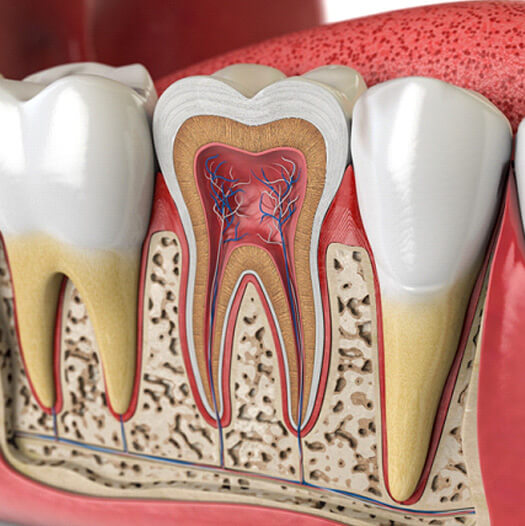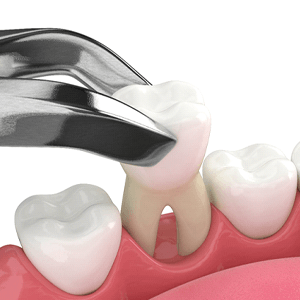Root Canal Treatment – Dallas, TX
Alleviate Your Pain, Save Your Tooth!
Do you feel a sharp pain run straight through your tooth when you bite down? Maybe you’re dealing with the opposite problem: a dull, persistent discomfort. Either way, it’s important that you schedule a consultation with Dr. Gabby Dizon so she can determine the root of the problem. If it’s a large cavity or a serious infection, then the solution may be root canal treatment (don’t worry – the reputation is way worse than the actual procedure). To learn more, get in touch with us or keep reading!
Why Choose Dizon Dental Aesthetics for Root Canal Treatment?
- Sedation Dentistry Available for Anxious Patients
- Top-Rated Dental Team in Dallas
- Save with an In-House Membership Plan
Do I Need Root Canal Treatment?

Pain is a common symptom of severe decay or a serious infection. However, that’s just one of many warning signs that root canal treatment is necessary. Between your biannual visits to our Dallas dental office, keep an eye out for the following:
- Persistent dental sensitivity
- Dark discoloration on one tooth
- Red, swollen, or bleeding gums
- A pimple-like bump on your gums
- Chronic bad breath
If these or any other abnormal dental symptoms arise, don’t hesitate to reach out to us to schedule an emergency exam.
The Root Canal Process

When you arrive at our office for your appointment, we’ll help you settle into the treatment chair, walk you through the step-by-step process, and answer any questions you have. If sedation dentistry is a part of your treatment plan, then we will start there. Otherwise, we will begin by thoroughly numbing the area of your mouth that we’ll be working on. Once that has set in, we will use special instruments to access the inner chambers of your tooth before removing the pulp. Then, we will sanitize the area thoroughly, fill it with a synthetic gutta-percha material, and place a dental crown over top to protect your treated tooth moving forward.
The Benefits of Getting a Root Canal

Patients are sometimes surprised to hear just how many benefits there are when it comes to root canal treatment. The first is that the procedure is completely painless from start to finish, and we’ll provide you with aftercare instructions to keep your discomfort to a minimum while you heal. Additionally, root canal treatment can stop the infection in its tracks, which can save your tooth from needing to be extracted down the line. Finally, this restorative dental service has an extremely high success rate, meaning that there’s a good chance you’ll enjoy the results for a decade or more if you take good care of your smile.
Understanding the Cost of Root Canals

Since patients rarely have the same exact dental needs, there’s really no such thing as a cookie-cutter treatment plan. In other words, we need to consider factors unique to your case in order to provide you with an accurate estimate of the price. Rest assured, we will review all of the financial solutions available along the way so there’s no added stress either. To learn more on the topic leading up to your next appointment, read on!
Factors That Can Affect Root Canal Cost

As we mentioned above, we need to consider factors unique to your case before we can provide you with the cost of your care. A few examples include the complexity of your case, the severity of the damage, the location of the tooth, and the type of restoration that’s needed. At your consultation, we will review each of these in-depth with you so you are confident in your treatment plan and have an opportunity to ask any questions that are on your mind.
Is it Cheaper to Pull My Tooth?

At first, it may seem that way. However, there’s more than just the cost of the tooth extraction to consider if you go this route. For example, you need to factor in the price of the dental bridge, denture, or dental implant that will fill the open space in your smile. You’ll also need to consider the long-term effects of removing a tooth, including bone loss in your jaw. That’s why it’s usually best to proceed with root canal treatment if that’s an option.
Does Dental Insurance Cover Root Canal Treatment?

Dental insurance companies sometimes cover a portion of the cost of root canal treatment. The best thing to do if you’re insured is to take a look at the fine print on your plan. If it includes an emergency exam, then you may not be responsible for the cost of that out-of-pocket. If it includes upwards of 50% to 80% of the cost of essential restorative care, then the price of both the procedure and the restoration may be significantly less. Again, it really depends on your specific plan, so don’t hesitate to read through it or reach out to your provider directly with any questions you have.
Other Options for Making Root Canal Treatment Affordable

At Dizon Dental Aesthetics, we offer a financial solution for those without dental insurance: our in-house dental plan. When you join, you’ll get access to a variety of benefits, including a significant discount on certain services completed at our office. One of the biggest perks is that you don’t have to worry about red tape, like waiting periods, insurance claims, and annual limits.
Root Canal FAQs
Are Root Canals Painful?
Since its reputation is so bad, many patients are surprised to hear that root canal treatment is designed to alleviate pain, not cause it. In other words, everything negative you’ve heard about this tooth-saving treatment is probably false. To ensure you don’t feel any discomfort in the treatment chair, we will thoroughly numb your mouth beforehand. Plus, we will use a gentle approach and the latest techniques to ensure you remain as comfortable as possible during your time in the treatment chair. We’ll also provide you with aftercare instructions to help you stay comfortable while you heal from home too!
How Long Does it Take to Recover from a Root Canal?
Usually, patients are able to return to work or school the next day and feel completely better around the three-day mark. Of course, there are some exceptions. For example, if your job is physically demanding, we recommend taking more than a day or two off of work to help prevent complications, like blood diverting from the site and delaying the healing process.
Note: In addition to answering any questions you have about the procedure beforehand and doing everything we can to make your time in the treatment chair stress-free and pain-free, we will provide you with aftercare instructions so you know what to do and what not to do during the healing period.
Can I Take Antibiotics Instead of Getting a Root Canal?
Although antibiotics can treat bacterial infections, they cannot be used in place of a root canal. The reason why is that the medication travels through your bloodstream, which doesn’t reach the pulp of your tooth. If you’re interested in learning about your treatment options aside from root canal treatment, don’t hesitate to ask us! We can discuss the other services we offer, like tooth extractions.
Can Root Canals Be Prevented?
Good oral hygiene habits don’t just help prevent cavities; they help prevent infections too! That’s why it’s so important that you commit to a solid oral hygiene regimen, which starts with brushing for a full two minutes each morning and evening and extends to flossing consistently.
Remember, protecting your teeth and gums from harm requires a commitment to other good habits too, like not smoking, keeping your consumption of added sugar to a minimum, and wearing a mouthguard during sports.
What Happens if You Wait Too Long for a Root Canal?
Whether due to fear or budget, it’s common for patients to try the “wait and see” approach when it comes to dental discomfort. However, the more time that passes, the more the root of the problem will develop. There will come a point where your pain subsides, but only because the infection has “killed” the root of your tooth on its path to spreading to your surrounding teeth and gums. In short, the longer you wait, the worse your oral health will get.
